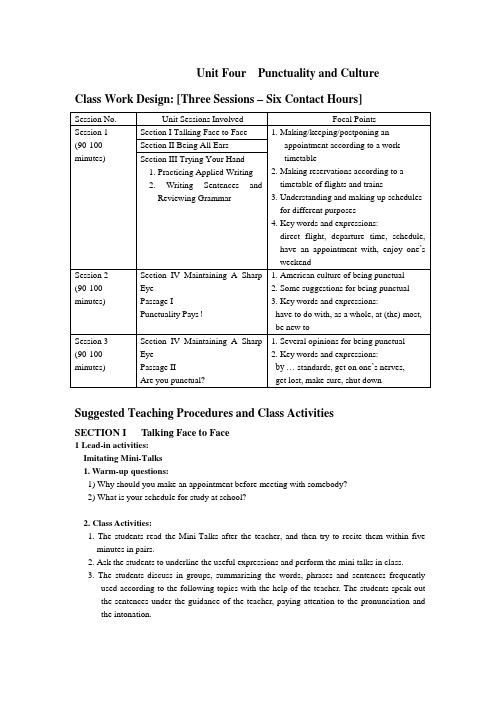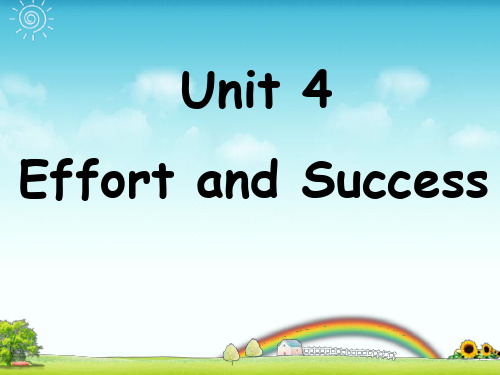新编实用英语电子教案unit4
新编实用英语综合教程3---Unit4--Training--Across--Cultures

It is hard to answer this complex question.
Back
Language Points
2 Important Words
2. diverse a. composed of distinct forms or qualities 不同的;多种多样的 e.g. Customers’ attitudes to products are diverse and complex. After graduation, he entered a larger and more diverse world for his career.
Unit Four Training Across Cultures
周玉霞
SECTION IV Maintaining a Sharp Eye
PASSAGE I
Cultural Diversity in the Workplace
SECTION IV Maintaining a Sharp Eye
• American women are either unusually fat or unusually thin, never of normal build.
• Americans wear very bright colours and they wear summer clothes even in winter.
Analysis: Remember… is an imperative sentence. Is infamous for… is a useful
expression meaning “因⋯而臭名昭著” in Chinese.
Translation: 要记住,英语因其语法复杂而臭名昭著,即使以英语为母语的人有时
新编实用英语综合教程_Unit_4_Punctuality_and_Culture

5 Task: Look at Mark's schedule in Exercise 3. An old friend in Hong Kong asks to see Mark on Thursday.
Back
Unit | Four
Studying Timetables and Schedules
What You Should Know About
1. Punctuality in social activities 2. Planning a work day / week 3. Use ts
Talking Face to Face
Study and Imitate
Imitate and Perform Speak and Complete Speak and Communicate
Unit | Four
SECTION I Talking Face to Face
Imitating Mini-Talks
Speak and Recite 1 Work in pairs. Practice the following mini-talks about schedules and timetables. 1) Asking for an Appointment with the Manager Window on Key Words A: I'd like to make an appointment with your manager. Do you think I could see him sometime this morning? B: Sorry, he's fully booked this morning. 预定,预约 A: How about tomorrow morning then? B: Yes, I think tomorrow morning would be fine. 2) Asking to Meet Mr. Peterson A: Mr. Peterson, I wonder if it would be convenient to meet you today. B: Let me see. I'm free this afternoon. Is that all right for you? A: Well, I've got a meeting from 2 to 4. Are you free tomorrow morning? B: No problem. Let's make it at 10 then. Unit | Four
新编实用英语第四册教案

—-可编辑修改,可打印——别找了你想要的都有!精品教育资料——全册教案,,试卷,教学课件,教学设计等一站式服务——全力满足教学需求,真实规划教学环节最新全面教学资源,打造完美教学模式《新编实用英语4》教案任课教师:程敏Unit One English Studies and TestsTeaching Objectives:1. Learn to talk about:1) Taking English tests2) Overcoming the troubles in English tests2. Learn to:1) Ask for and give suggestions for Englishtests2) Ask for and give suggestions for learningEnglish3. Learn to write:1) Applied Writing: Filling out a testapplication form2) Functional Writing: Describing functionsSection ITalking Face to FaceSection IIBeing All EarsSection IIIMaintaining a Sharp EyePassage I Read the TextImportant Words and Expressionsacquire by learning or experience; tidy up; take on学会,获取(知识);收拾,整理;承载,开车去接pick up:What a coincidence that I was in New York at the same time as you.two or more events similar or related happening by chance at the same time or place; the condition or fact of coincidingcoincidence n. coincident a. (with) coincidental (ly) a. (ad.) 同时发生的(地)coincide v. (with)I have no illusion about his coming to see me.We were under an illusion that the company was doing very well but it was in difficulty.have no illusion be fully conscious of the true nature of sth esp. bad or difficult 对……不抱幻想be under an illusion to believe wrongly 有错觉,误以为illusion n. 错觉,幻觉;幻想All opposition to the company collapsed in the face of the threat of unemployment.She collapsed at the end of the marathon race.fall suddenly and completely; break down; to fall helpless or unconscious 瓦解, 崩溃,垮掉;倒下,晕倒collapse v. (intr.)not necessarily: 不一定Food that looks good doesn’t necessarily taste good.What he said just now came straight from his heart.Many Chinese words have been mixed into English like tea and jiaozi.mix into: 融入(of) reasonable hope of sth. happening, sth which is probable soon; every prospect a strong possibility; in prospect likely to happen in the near future 展望,期望,前景;极有可能;即将面临的,期望中的Difficult Sentences●(Para.1) A language belongs to a group of people and a word or saying means what thespeech community has made it mean.语言归属于讲这一语言的人,而词语或话语的意义则是讲这种语言的人们所赋予的。
新编实用英语综合教程-Unit-4-Punctuality-and-Culture省公开课金奖全国赛

Bob: Good. What's the departure time? Receptionist: 8:45 a.m. And the arrival time in Hong Kong is 11:45 in the mUo1nr1in/t8i|4nFgo.ur
Joe: What about Wednesday?
Mark: I've got an appointment at 8:30 with Mr. Anderson, the bank manager. In the
afternoon I'm taking the 4:45 flight to Hong Kong for a conference.
Bob: Oh, how long does it stop over in Guangzhou? Receptionist: From 11:50 to 12:50.
Bob: 11:50 to 12:50. That's an hour. Well, I prefer a direct flight. Receptionist: I'm sorry, but there's no direct flight on Tuesday.
A: When does it arrive in Macao?
Back
B: At 3:40 p.m.
U6n/8it4| Four
Acting out the Tasks
Speak and Perform
Unit 4新编实用英语课堂设计

Unit Four Punctuality and CultureClass Work Design: [Three Sessions – Six Contact Hours]Suggested Teaching Procedures and Class ActivitiesSECTION I Talking Face to Face1 Lead-in activities:Imitating Mini-Talks1. Warm-up questions:1) Why should you make an appointment before meeting with somebody?2) What is your schedule for study at school?2. Class Activities:1. The students read the Mini-Talks after the teacher, and then try to recite them within fiveminutes in pairs.2. Ask the students to underline the useful expressions and perform the mini talks in class.3. The students discuss in groups, summarizing the words, phrases and sentences frequentlyused according to the following topics with the help of the teacher. The students speak out the sentences under the guidance of the teacher, paying attention to the pronunciation and the intonation.1) Sentences frequently used for making and keeping an appointment:(1) I’d like to make a n appointment with your manager.(2) Mr. Peterson, I wonder if it would be convenient to meet you today.(3) Would you like to schedule the appointment?(4) Could I have an appointment to see you?(5) Shall we meet at 9 a.m. at your office the day after tomorrow?(6) If you are free, I’ll come to see you this weekend.(7) Yes, I think tomorrow morning would be fine.(8) Let me see. I’m free this afternoon. Is that all right for you?(9) Will this afternoon be all right for you? But I can only spare you an hour and a half today,from 4 o’clock.(10) You can make it at 2:00 if that is convenient for you.2) Sentences frequently used for postponing an appointment:(1) I wonder if we could postpone the appointment to tomorrow afternoon.(2) I’m afraid that the manager is all booked up this week. How about next week?(3) Dr. Cook won’t be able to see you at the time suggested.(4) I wonder if it’s convenient to change our appointment from tomorrow to next Wednesday,still at the same time.(5) Mr. Smith has to cancel all his appointments because he’s got something urgent to attendto.(6) Anytime except today. Please give him a call before you come.(7) Sorry, the whole afternoon is filled up here. Will tomorrow do?(8) The dinner appointment has been cancelled.3) Sentences frequently used for making a reservation of a flight or train ticket:(1) Miss Wang, is there a direct train from here to Chengde?(2) What time does the next train to Guanzhou leave?(3) Do I have to change trains anywhere?(4) I’d like to get two tickets to Beijing at 9:00 this morning.(5) When do you have flights for/to Macao?(6) When does it arrive in Macao?(7) Excuse me, is the 5:30 flight from Hong Kong on time?(8) Can I have a seat on Flight 455 to New York tomorrow afternoon?4) Sentences frequently used for making up a schedule:(1) I have a busy schedule this week.(2) What’s your schedule for tomorrow?(3) I’ll be enjoying my weekend in Hong Kong.(4) What’s your plan for this weekend?(5) This morning I need to write a business report.(6) The conference is on Thursday, right?(7) I’ll take the 2:15 flight back on Friday afternoon.(8) The office hours are from 9 a.m. to 6 p.m.(9) Lunch begins at 1 p.m. and lasts one hour.Studying Timetables and Schedules1. Warm-up questions:1) How can people buy flight tickets now?2) What are the advantages of making a schedule for your work?2. The students read and translate the sample timetable and schedule under the guidance of theteacher.2 Act-out activities:Sample dialogues1. The students read the sample dialogues after the teacher, trying to imitate the teacher’spronunciation and intonation.2. Ask the students to read the sample dialogues in pairs.3. Groups work: Ask the students to categorize the expressions for talking about timetables andschedules in the sample dialogues into two groups.1) Sentences for talking about flight timetables and giving responses:(1) Is there a flight to Hong Kong on Tuesday, the 16th?(2) What about Wednesday, the 17th?(3) There is one on Wednesday, the 17th.(4) What is the departure time?(5) The arrival time in Hong Kong is 11:45 in the morning.2) Sentences for talking about work schedules:(1) I have a busy schedule this week.(2) This morning I need to write a business report and this afternoon at 1:30 I’ll discuss thereport with the general manager.(3) What is your schedule for tomorrow?(4) I’m attending the sales meeting at 9:00 in the morning.(5) And in the afternoon at 3:00 I’m seeing Mr. Black, the marketing manager.(6) The conference is on Thursday, right?(7) I’ve got an appointment at 8:30 with Mr. Anderson, the bank manager.(8) In the afternoon I’m taking 4:45 flight to Hong Kong for a conference.(9) I will take 2:15 flight back on Friday afternoon.4. Group work: Give the students several minutes to prepare a timetable for a one-day visit toyour college.5. Pair work: Make a dialogue talking about reserving flight or train tickets.6. Do Exercises 5 and 6 in pairs.3 After-class activities:1. Pair work: Each pair makes a dialogue according to the tips in one of the five tasks in Speakand Perform. There will be a class presentation in the next class period.2. Group work: Design a schedule for your after-class activities with PPT, and then present it anddiscuss how to make a schedule in the next class period.3. Pay a visit to the website /programs/view/ti_KMzwfRuY/to watch avideo about making an appointment for a car tune-up.SECTION II Being All Ears1 Learning Sentences for Workplace Communication1. Give the students a few minutes to read through the printed materials for each listening item.2. Listen to the tape for the first time by looking at the corresponding Chinese version. Whilelistening to the English sentences, the students try to remember the meaning of each of the sentences they have heard. The focus here is on cross-reference of the English sentences and their Chinese meanings.3. Play the tape for a second time, and ask the students to the exercises in this section.4. Play the tape for the third time with a pause after each sentence, and ask the students to repeatthe sentence during the pause.2 Handling a Dialogue1. Give the students a few minutes to read through the printed materials for each listening item.2. Listen to the tape for the first time without looking at the book.3. Play the tape for a second time, and ask the students to answer the following questions orally:1) When is the conversation taking place?2) What time is Susan having a meeting that day?3) When is Susan to meet Jack?4) Why can’t Susan meet Ann this week?5) When can they meet?4. Play the tape for the third time, and the students read the dialogues following the tapesimultaneously and trying to catch up the speed and simulate the speakers’ tones.5. Do the exercises in this section.3 Understanding a Short Speech/Talk1. Give the students a few minutes to read through the printed materials for each listening item.2. Listen to the tape for the first time without looking at the book.3. Play the tape for a second time, and ask the students to do the exercises in this section.4. Play the tape for the third time with a pause after each sentence, and ask the students to takenotes of the key words.SECTION III Trying Your HandPracticing Applied Writing1 Sample analysis:The teacher summarizes briefly the format and language used in timetables and schedules. The teacher may show the following passage with PPT (If there is no PPT prepared, ask the students to take a dictation of the passage.). Afterwards, ask the students to read it and translate it into Chinese orally.If you want to travel by plane or train, you’d better consult/look up a flight or train timetable. Atimetable is a list of times at which some events are planned to happen, especially the times when buses, trains and planes leave/depart and arrive.A schedule is a list of planned activities or things, in which the times or dates when they are due/planned to happen or be done are shown.A timetable or schedule can be written in the form of a table or a list.2 Simulated writing:1. The students read and translate the passage in the sample and then fill in the table with theinformation in the passage.2. Do Exercises 2 and 3 in groups.Writing Sentences and Reviewing Grammar1 The teacher gives a brief summary of the basic rules of using verb tenses.The verb tenses give information about when and how an action takes place. Remember to change verb tenses when there is a real change in time. The following are the main types of verb tenses:2 Do Exercises 4, 5 and 6 in groups.3 Assignment for this section:Written work: Suppose you are the secretary of a company’s manger. You are required to make a schedule for the business meeting to be held form Dec. 20 to 21. The agenda of the meetingincludes the manager’s report of the annual production followed by the discussion of the production plan for the next year.SECTION IV Maintaining a Sharp EyePassage 1 Punctuality Pays!1 Warm-up questions:1. What’s your idea about being late for an appointment?2. If you are late for class, what would you say to the teacher and your classmates?2 Guided reading aloud of the passage:The students read the passage after the teacher for the first time, trying to imitate the teacher’s pronunciation and intonation, and then read it in class individually. The teacher should pay attention to correcting the students’ pronunciation and intonation.3 Explanation of difficult words and expressions:The students are required to have a discussion in groups to pick out the difficult words and expressions in the whole passage which they don’t understand and report them to the class. The teacher will demonstrate the usage of those chosen points, and then ask the students to make up at least two sentences with them in groups. In this passage, apart from what have been chosen in Language Points in Teacher’s Book,the following points are encouraged to be chosen and practiced on.1. have to do with: be connected toe.g. Mr. Green denied having anything to do with the car accident.2. as a whole: as a single unite.g. He described the move as an achievement of the company as a whole.3. at (the) most: not more thane.g. The repairs to your car will cost $135 at the most.4. be new to: just begin to know about or to doe.g. Please give her a hand because she is new to the job.4 Teaching suggestions for understanding the passage in detail:1. Paragraphs 1 and 2:1) The students read these two paragraphs loudly together.2) Group work: Have a discussion to translate these two paragraphs into Chinese. There will be agroup presentation in class.2. Paragraph 3:1) Ask the students to read this paragraph individually for two times.2) Group work: Have a discussion to answer the following questions:(1) Whom was the author going to meet that day?(A team from India.)(2) Why did he forget the appointment?(Because he forgot to log the appointment into his schedule.)(3) When did he get to the meeting room?(More than 30 minutes later than the appointed time.)(4) What was the attitude of the Indian people toward the author’s coming late?(They did not care about his coming late.)3. Paragraphs 4 and 5:1) Read these two paragraphs after the teacher.2) Pair work: One student asks 4 or 5 questions about these two paragraphs, and the other onegives the answers. Then the students exchange their roles to do the same work again.(For example: What would Americans do if someone is very late for the appointment?How long would Americans wait for the late comers?)4. Paragraphs 6, 7, 8 and 9:1) The students read these four paragraphs loudly by themselves.2) Meanwhile, the teacher writes down the following sentences with some words missing on theblackboard or shows them with PPT. The students are asked to complete the sentences.Tips for etiquette about appointments and punctuality:A. Make your appointment ________________. (in advance)B. Don’t just ________ for in-person meeting without any appointment. (show up)C. Inform the other party if you are ___________. (more than a few minutes late)D. Don’t change ________ at the last minute. (plans)5 Summary of the passage:1. Point out the words or phrases related to being punctual in the passage.Related words :punctual, schedule, appointment, re-schedule, punctuality, plan, …Related phrases:understanding of punctuality, on time, well-kept schedules, in advance, run late, changing a plan2. Group work: Have a discussion to prepare a short study report about how to be punctual. Agroup presentation in class is required.6 Suggestions for doing exercises:1. Group work for Exercises 2 and 3: Underline the useful expressions in each sentence.2. Pair work for Exercises 4 and 5: Each student writes out the sentence patterns they are going touse and then write out their translation. Afterwards they check up each other’s work, correcting the mistakes. At last, the whole class repeat the English translation of the sentences together.7 Assignments for this section:1. Group work: Search online to find cultural differences in making or keeping an appointment.There will be a group presentation in the next class period.2. Preview Passage II.PASSAGE II Are you punctual?1 Warm-up questions:1. What’s your attitude toward keeping an appointment: being late, punctual or early? And Why?2. What do you think of people who are always being late?2 Guided reading aloud of the passage:The students read the passage after the teacher for the first time, trying to imitate the teacher’pronunciation and intonation, and then read it in class individually. The teacher should pay attention to correcting the students’ pronunciation.3 Explanation of difficult words and expressions:The students are required to have a discussion in groups to pick out the difficult words and expressions in the passage which they don’t understand and then report them to the class. The teacher will demonstrate the usage of those chosen points, and ask the students to make up at least two sentences with them in groups. In this passage, apart from what may have been chosen in Language Points in Teacher’s Book,the following points are encouraged to be chosen and practiced on.1. by … standards: according to the judgments of qualitye.g. The system was clearly primitive by later standards.2. get on one’s nerves: make somebody annoyede.g. Lately he hasn’t done anything and it is getting on my nerves.3. get lost: unable to find the waye.g. I got lost on the first day when I visited London last year.4. make sure: find out for certaine.g. He looked in the bathroom to make sure that he was alone.5. shut down: stop workinge.g. The crisis has caused several car factories to shut down.4 Teaching suggestions for understanding the passage in detail:1. Part I (Answer 1):1) The students read this part after the teacher.2) Memory training: Give the students 3 minutes to learn this part by heart. Then ask somestudents to recite it in class.2. Part II (Answers 2 and 3)1) Ask the students to read this part individually for two times.2) Pair work: Each student justifies his or her opinion about Answer 2 or Answer 3.(Suggestions:Answer 2: I think being on time is a good etiquette. And I can’t understand why being a little later for a party is also regarded as a good etiquette. I’m always early for everything, because I think being late is impolite.Answers 3: We should be absolutely on time for a date, appointment, and class, etc. In my opinion, being late is an insult to the person(s) you are meeting, because our times are of the same importance.)3. Part III (Answers 4, 5 and 6)1) The students read this part loudly together.2) Group work: Have a discussion to find the answers to the following questions:(1) What does the person giving Answer 4 do to be punctual?(He keeps all his clocks 10 minutes fast.)(2) What idea does the person giving Answer 5 have about punctuality?(He can’t be late even if he wants to be.)(3) What was the situation in which the person giving Answer 5 got late once?(He got lost and he was late for an hour.)(4) What was the trouble with the person giving Answer 6?(He got a girl friend who was always late for dates.)4. Part III (Answer 7)1) The students read this paragraph loudly by themselves.2) Dictation practice. The teacher reads each sentence of the paragraph twice, and the studentswrite them down. Afterwards, the students check them up with their partners.5 Summary of the passage:The teacher writes down the following table on the blackboard or shows it with PPT. The6 Suggestions for doing Exercise 7:Group work: Ask the students to prepare the Chinese translation of the sentences in Exercise 7 in groups, and there will be a group presentation in class afterwards.7 Assignments for this section:1) Written work: Write out your own answer as Answer 8 to the question Are you punctual? Youare required to give examples to support your idea.2) Preview Sections I, II and III in Unit Five.SECTION V Appreciating Culture Tips1 Understanding of the business mottoes:Ask the students to read the appreciate logos and business mottoes.2 Group discussion:1. Which logos or business mottoes impress you most? Give your comments.2. Please list some other logos or business mottoes you are familiar with.3. Search online for more similar logos or business mottoes and exchange them in the next classperiod.。
unit 4 新编实用英语

精彩片段赏析
Therefore, We learn from the movie that it is...
Never Too Old to Live Your Dream
Have a Try
分角色朗读课文
Detailed Study of Text A
While-Reading Task
innocent age?” I asked. rich husband, get married, have one or two
children, and then retire and travel.”
“你为什么在这么年轻而天真的年龄上大学?”我问。 她开玩笑地回答说:“我要在此遇到一个有钱的丈夫, 结婚,生几个孩子,然后退休,去旅游。”
就在我站起来四处张望时,一只手轻轻地搭 在了我的肩上。我转过身一看,一位满脸皱 纹个子矮小的老太太正冲着我微笑。这微笑 使她浑身光彩照人。
• 2 She said, “Hi, handsome. My name is Rose. I’m eighty-seven years old. Can I give you a hug?” • 3 I laughed and answered, “Of course you may!” and she gave me a big hug.
到学期末,我们请罗斯在我们的足球宴会上讲话。 正当她要开始已准备好的演讲时,她的5寸长3 寸宽的卡片掉在了地上。我们笑了起来,而她则 清了清嗓子,开始了演讲:
While-Reading Task
10 “We do not stop playing because we are old; we grow old because we stop playing. There are secrets to staying young, being happy and achieving success.” 11 You have to laugh and find humor each and every day. You’ve got to have a dream. When you lose your dreams, you die.
新编实用英语第二册Unit4 课件

Follow the Samples
B.Sentences for checking in and out at a hotel: a. I have a reservation with you. b. I have made a reservation here. c. I would like to stay in your hotel for three days. d. What’s the rate for one person per night? e. I would like to check out. f. Please tell me your room number. g. Do you accept a traveler’s check? h. May I pay by credit card? Practice the following sentences. 1. May I have your name, please? 2. May I have a look at your passport, please? 3. Would you please fill out the registration form? 4. How would you like to pay, in cash or by traveler’s check?
Task one: You are leaving for Shanghai tomorrow. Make a reservation at a hotel there by phone.
Task two: You want to check into a hotel for which you have already made a reservation.
《新编实用英语二》Unit4 Talking

5.renovate v. [ ‘renəveit ] 更新,革新,刷新
make brighter and prettier 6.renovation n. [ .renə‘veiʃən ] n. 革新,刷新,修理
the act of improving by renewing and restoring *The hotel will reopen next week after its£1 million
Oh, yes, we do. G: Good. I would like to have a non-smoking room.
h
15
I Would Like to Book a Double Room
R: There are many non-smoking room available in our hotel. May I have your name, please?
h
12
2. Warming up for the new class
When you travel, most often you have to make reservations at a hotel, therefore you must know how to book a hotel room and how to check in or check out at a hotel. They are quite useful and important pieces of information and this unit will tell you how.
back
h
5
Sample 1
Holiday Hotel Guest Services Guide
- 1、下载文档前请自行甄别文档内容的完整性,平台不提供额外的编辑、内容补充、找答案等附加服务。
- 2、"仅部分预览"的文档,不可在线预览部分如存在完整性等问题,可反馈申请退款(可完整预览的文档不适用该条件!)。
- 3、如文档侵犯您的权益,请联系客服反馈,我们会尽快为您处理(人工客服工作时间:9:00-18:30)。
Unit 4Key and Translation SECTION ITalking Face to FaceThe topic area of Talking Face to Face in this unit is to make a timetable or a schedule. The focus of functions is on the patterns that are appropriate for making appointments and arranging activities in different situations.Imitating Mini-Talks1 Work in pairs. Look at the pictures and practice the following mini-talks about schedules and timetables.Acting out the Tasks2Work in pairs and act out the tasks by following the above mini-talks.Studying Timetables and Schedules3Timetables and schedules are important in planning our activities. Now let’s read the following timetable and schedule.马克的时间表(2011年6月)Following Sample Dialogues4Read the following sample dialogues and try to perform your own tasks. Putting Language to Use56SECTION II Being All EarsLearning Sentences for Workplace Communication 1 Listen to 10 sentences for workplace communication cross-referenced with their Chinese translations.Script:1) Would you please arrange a meeting for me with Dr. Johnson2) I’d like to make an appointment to see Mr. Black.3) I’d like to confirm our meeting tomorrow afternoon.4) The train is due to arrive at 9 o’clock, but i t has been delayed for one hour.5) I’d like to see you tomorrow if you have time.6) I’m wondering if you’d like to come and discuss the new plan in my office.7) I’d like to change the appointment from Tuesday to Wednesday.8) Could we put it off to next week9) Let’s say 3:30 Friday afternoon.10) Please tell me the departure and arrival time.2Listen to the following sentences for workplace communication in Column A and match each one with its Chinese version in Column B.3Listen to 6 sentences for workplace communication and choose their right responses.Handling a Dialogue4Listen to a dialogue and supply the information by filling in Susan’s schedule.key:Susan’s ScheduleMarch 11, Monday have a meetingMarch 12, Tuesday have dinner with friendsMarch 13, Wednesday an appointment with Mr. PetersonMarch 14, Thursday extra work in the officeMarch 15, Friday go to evening classesUnderstanding a Short Speech/Talk5 Now listen to a short tour guide speech and fill up the blanks according to what you have heard. The words in brackets will give you some hints.Script:Hello, everyone. I’m Lily, your tour guide. I’m sure you are excited about today’s6Listen to the speech again and complete the information in Column A with the right choices in Column B.SECTION III Trying Your HandPracticing Applied Writing1 Fill in the office hours by making use of the information in the passage that follows.Writing Sentences and Reviewing Grammar3. He told us he (had) joined the Party in 2010.10. He lived in London until 2010.SECTION IV Maintaining a Sharp Eye Passage I Punctuality Pays!Information related to the reading passage Americans and Europeans consider time to be an asset that can be spent and saved; therefore, proper scheduling of time and its appropriate allocation to various competing tasks is an important part of organizational management. Variations in time use are expected to influence performance and stress, as well as other outcomes. It is a vital strategic element. The large amount of management processes and methods developed to improve performance by managing time use proves the importance placed on time. Here are a few famous quotes and sayings about time and punctuality:Do you love life Thus do not squander time, for that’s the stuff life is made of. — Benjamin FranklinTime wastes things away, and all things grow old through time. — Aristotle Time takes all and gives all. — Giordano BrunoLost wealth may be replaced by industry, lost knowledge by study, lost health by temperance or medicine, but lost time is gone for ever. — Samuel Smiles Few things tend more to alienate friendship than a want of punctuality in our engagements. I have known the breach of a promise to dine or sup to break up more than one intimacy. — William HazlittPunctuality is the soul of business. — Thomas Chandler HaliburtonWhile we keep a man waiting, he reflects on our shortcomings. — Anonymous Language Points1Explanation of difficult sentences1. (Para. 1) One of the cultural differences that tend to annoy Americans has to dowith understanding of punctuality.Analysis: Has to do with is a phrase meaning has a specified relationship with Itis the predicate of the sentence.That introduces a restrictive relative clause modifying differences.Translation: 有一种常会惹恼美国人的文化差异可能关系到对守时的不同理解。
